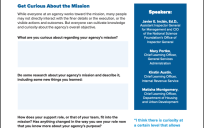
In the era of the Great Resignation, many employees have been shaken by their career path and whether they are happy at their current jobs. The pandemic has challenged work dynamics that have either enhanced or damaged an employee’s satisfaction with their job. But were we happy with our jobs to begin with, even before the pandemic? And why or why not? For me, the answer came through career values.
The Exercise
I discovered this answer through a team-building exercise from my human capital office: the Knowdell Career Values Card Sort. The premise of this exercise was simple. We were given a card deck comprised of 50 different career (and arguably life) values. You had 10 minutes to organize the values into five categories: Always Valued, Often Valued, Sometimes Valued, Seldom Valued and Never Valued. You could only put eight values into the Always Valued column. This might sound easy …
As I stared at these cards, I began to think about what really mattered to me in my career and my life. What was a deal breaker when it came to applying for a position? What made my current position so desirable to me? We also had to consider what was important to ourselves, and not what we thought should be important. Full disclosure: Family was one of the values, and it wasn’t in my Always Valued column! I felt terrible about it, but ultimately realized when it came to my career, family didn’t have as much of an impact.
The Cards Don’t Lie
My Always Valued column comprised of the following values:
- Knowledge
- Exercise Competence
- Friendships
- Help Others
- Fun and Humor
- Creative Expression
- Creativity
- Change and Variety
- Work-Life Balance
- Security
When I sat back and looked at my values, I began to piece together what I appreciated about my position and what was, or had been, frustrating me in my career. I am someone who thrives in environments where I can continuously learn and increase my knowledge base. Connection with my coworkers and my clients caters to my value of friendships and helping others. I also believe in instilling joy into my work by making it fun and creative – 40 hours a week is a huge chunk of someone’s life. It shouldn’t be boring! I wasn’t even surprised by the juxtaposition between my desire for change and variety, and security. I don’t want to do the same thing every day, but I also want to know that I’m going to have a job the next day! So to me, these cards made total sense.
So what’s the point?
Cool, Myranda, you were able to put a name to your career values. Of course this provides value in itself – you don’t know what you don’t know, and being able to pinpoint these things can provide you with a clearer sense of self. However, what really struck me was how these values connected to my current job.
I was a bit lost in the pandemic and feeling unhappy at my current position, and I wasn’t really sure why. I had wondered whether I had burnt out of the position and just needed to try something new. Before long, I began to apply for other positions and started getting interviews. But as I began to think more and more about it, I really didn’t want to leave my job, and I wasn’t really sure why … until we did this exercise.
My current job ticks off most, if not all, of my career value boxes. My supervisor provides me the space to develop new skills, work on projects outside of my job description, and try new approaches to training. I have developed deep friendships with my coworkers over the years. I am able to help others every day through my trainings and teachings. And hey, it’s a federal job – pretty secure!
I was also able to pinpoint the values that were feeling a bit strained in my current job as a result of the pandemic. I hadn’t had the opportunity to be as creative as I would have liked. There were a few times where my work-life balance was feeling compromised. So once I identified those areas where I was stuck in my job, I was able to figure out ways to fix it. I set more boundaries for myself, gave myself time to brainstorm more topics, and spent some time to, well, play.
How can this help you?
After this exercise, our human capital manager told us “if your position does not honor your career values, you are probably not happy in that position.” I was really struck by that statement. It was so simple, yet something I didn’t sit down and think about. I ended up conducting this same exercise with my husband to figure out his values. It even helped me better understand why he was happy with his job.
Now, you don’t need to have the Knowdell Card Deck to figure out what is important to you. There are plenty of resources online for you to identify what your ideal position looks like, such as this article. I encourage to take 10 minutes to pinpoint eight things that are vital to your professional (and even personal) happiness. Then ask yourself: Is your position fulfilling these values? If you’re interviewing for a job, ask questions to find out if that position will satisfy your values. It might make or break a huge component of your overall wellbeing.
Myranda Whitesides is a Performance Support Specialist for the Interior Business Center, the Department of Interior’s Shared Services Center. She conducts personnel and payroll systems training for over 50 federal agencies, as well as providing training in Diversity and Inclusion for her peers. Myranda also serves as the Education Co-Director for the Mile High Society for Human Resources Management (SHRM), coordinating Educational content for Human Resources professionals in the Denver Metro area. Myranda also enjoys singing, camping, and exploring local breweries and restaurants with her husband, Daniel.
Interested in becoming a Featured Contributor? Email topics you’re interested in covering for GovLoop to [email protected].





Leave a Reply
You must be logged in to post a comment.